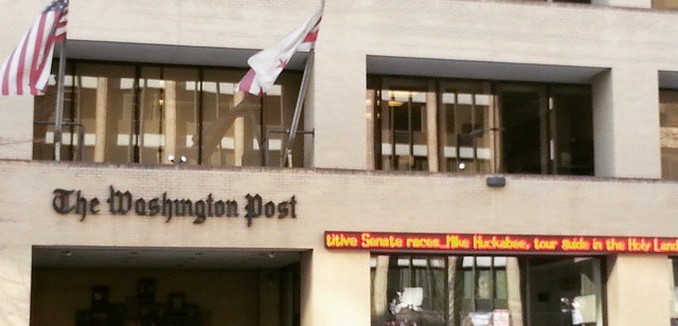President Barack Obama must address the “legitimate questions” Israeli Prime Minister Benjamin Netanyahu brought up in his Congressional speech yesteray, a staff editorial in The Washington Post argued today.
The editorial’s argument was based on the Netanyahu’s explanation of the two major concessions that the United States has given to Iran, as well as the nature of Iran’s regime.
His speech singled out “two major concessions” he said would be part of any deal the United States and its partners conclude with Iran. The first is the acceptance of a large Iranian nuclear infrastructure, including thousands of centrifuges for uranium enrichment. The second is a time limit on any restrictions, so that in as little as a decade Iran would be free to expand its production of nuclear materials. Consequently, Mr. Netanyahu said, the deal “doesn’t block Iran’s path to the bomb; it paves Iran’s path to the bomb.”
The Israeli prime minister’s most aggressive argument concerned the nature of the Iranian regime, which he called “a dark and brutal dictatorship” engaged in a “march of conquest, subjugation and terror.” Saying that the regime’s ideology is comparable with that of the Islamic State, he asserted that it could not be expected to change during the decade-long term of an agreement. He proposed that controls on the nuclear program should be maintained “for as long as Iran continues its aggression in the region and in the world.”
The editorial explained that Netanyahu’s demand that all restrictions on Iran’s nuclear program remain in place as long as the current clerical regime exists is consistent with American policy since 1979, “but Mr. Obama appears to be betting that detente can better control Iran’s nuclear ambitions and, perhaps, produce better behavior over time.” Even as the administration was preparing to extend the Joint Plan of Action last November, Obama once again signed a letter attesting to the continuation of the national emergency regarding Iran.
After citing Netanyahu’s argument that the Iranian regime is vulnerable to sanctions that must be kept in place until Iran rolls back its nuclear program, the editorial asks “Is that wrong? For that matter, is it acceptable to free Iran from sanctions within a decade and allow it unlimited nuclear capacity?”
The editorial argues that simply saying that Netanyahu offered no alternative to the president’s strategy “will not satisfy those in and out of Congress who share Mr. Netanyahu’s legitimate questions,” and urges the president to stop his “political attacks on Mr. Netanyahu…[and] explain why the deal it is contemplating is justified — or reconsider it.”
Though the editors of The Washington Post initially supported the Joint Plan of Action signed between Iran and the P5+1 nations in November 2013, in recent months they have been questioning the administration’s approach to the negotiations. In October, observing that Iran had not made any concessions during negotiations, an editorial in the Post urged the West to “hold the line” with Iran against any further concessions. In November, an editorial called on the president to consult more closely with Congress on its nuclear diplomacy with Iran. A month later, an editorial questioned how a regime that detained Post reporter Jason Rezaian in violation of its own laws could be trusted with a nuclear program. A few weeks ago, an editorial called for increased pressure on Iran.
[Photo: ShashiBellamkonda / Flickr ]




